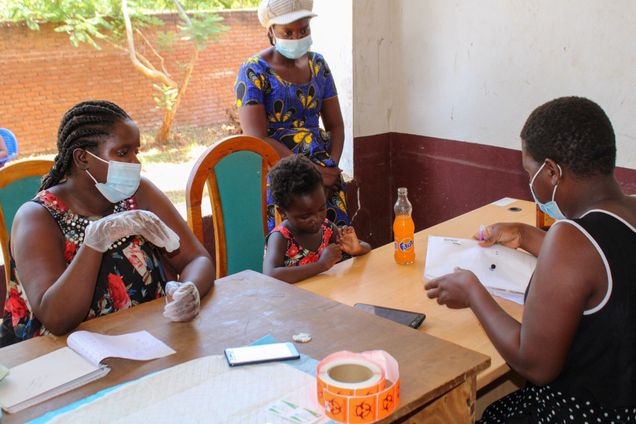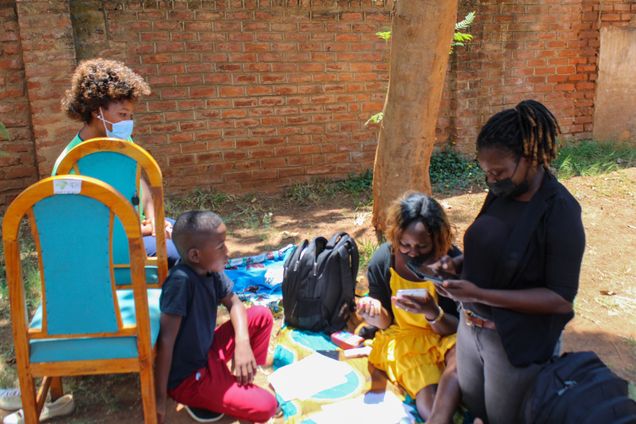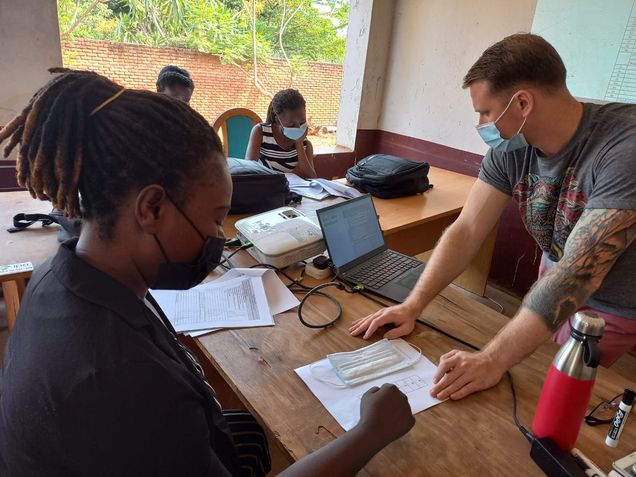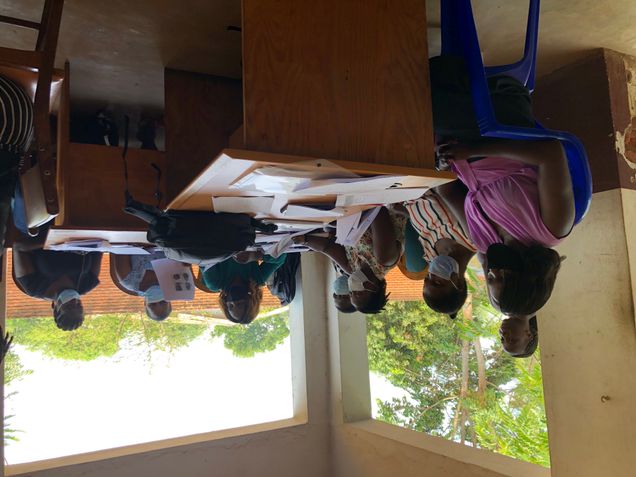Returning to Field Research in Malawi: Q&A with Mahesh Karra

By Emanne Khan
For scholars engaged in long-term research, the ongoing COVID-19 pandemic has complicated everything from data collection to travel. As the pandemic has stretched on for nearly two years, it has become part of daily life and researchers are learning to work within the constraints of the pandemic and when able, cautiously resume field research.
In October 2021, Human Capital Initiative Associate Director Mahesh Karra traveled to Malawi to conduct fieldwork, his first visit to the country in two years. Karra, a development economist whose current research focuses on the implications of improving access to family planning and maternal and child health services in South Asia and Sub-Saharan Africa, was accompanied on the trip by Boston University alum Daniel Maggio, who is currently pursuing his PhD at the Cornell University Dyson School of Applied Economics and Management. Drawing on data from previous fieldwork, Karra and Maggio recently published policy recommendations for improving contraceptive use and birth spacing among women in Malawi.
Below, Karra responds to questions about his return to the field and shares the one policy change he would make overnight:
Q: You recently returned from conducting field research in Malawi. What project or projects were you conducting fieldwork for, and what was the planning process like?
MK: The Malawi Family Planning Study, one of the longest standing projects that I have in the country, started in 2016 when I was a graduate student. The study is a randomized controlled trial conducted with 2,000 women who were pregnant or had recently given birth who were recruited to participate in a two year-long intervention. Women who were randomized to the intervention group were given access to family planning services and counseling, as well as transportation to a clinic for free family planning and reproductive health services. Since 2018, we’ve been conducting annual follow-ups to see how life has changed for the women in the study, both in terms of their choices for family planning, but also regarding fertility, human capital, whether they were able to go back to work and whether their children were getting more investments as a result of women having more time at home. We were supposed to go back in 2020 for follow-up, but because of COVID-19, we had to delay by a year. The primary reason I went in October was to restart longer-term follow-up, which would be the fourth wave of data collection with women in the study and their children.
Due to COVID-19, we had to wait until there was an opportune moment to conduct fieldwork, on both the US and the Malawian sides. One of the challenges with our project is that the fieldwork has to be conducted in person. We measure children’s height and weight. We do rapid blood tests for anemia for women and children and cognitive testing with the kids. During our visit, we took extra precautions, such as social distancing, mask wearing and we went through a series of protocol reviews with a standard operating procedure to collect data safely.

Q: When you arrived, was the experience of being back in the field different from your previous experiences? Did you have to adjust your research methods to account for the COVID-19 pandemic?
MK: Interestingly, when I arrived back in Malawi, it didn’t look very different from when I had left in 2019. Of course, people were masked and there were extra precautions in place, but relatively speaking, life was as it had always been. I think that’s a pretty important finding for me, because in the US and in Europe, life kind of stopped during the pandemic. There was pre-March 2020, and then post-March 2020, where our lifestyle, our engagement, our ability to work has all transformed. That’s not necessarily the case in most low- and middle-income countries, where people can’t stop working and they have to feed their families and meet their consumption needs. In Malawi, stopping work for COVID-19 might probably be more costly for families than continuing to work and facing the risk of getting infected. Our field team and local partners have been waiting for us to come back. All of that was put on pause from our end, and that was really, really challenging, because people had to find work in the meantime.

Q: How important is it to have local partners when conducting research in other countries or communities?
MK: Local partners make or break the study. It’s not possible to do the type of work that we do without strong local collaboration and support, and also local leadership to own the project and take the project results forward to inform programs and policies. Yes, I’m there, and I’m helping and supporting the project in the ways that I can, but the results are very tangible for Malawian families and communities. The most important thing is to have constant engagement with the communities where we work. Our primary end user and target clients are the people in those communities. We have constant contact with local village leaders, community councils and with the women whom we’ve been interviewing. At a higher level, we’ve been in contact with the Malawi Ministry of Health and the Reproductive Health Directorate, and the results of our studies are shared with them. We are currently in discussions about how our results can inform programs and policies for the public sector, private actors and nongovernmental organizations (NGOs).

Q: Now that you’re back from the field, what are you going to do with the information gathered on your trip?
MK: There’s a lot of work left to do. To be honest, we’ve collected so much data over the past five years that we are still grappling with data from year one and year two. The production process for research is always slower than what policymakers, practitioners and local stakeholders demand of us. The best we can do at this time is to give them previews of our findings. We are currently analyzing data from our first three waves of data collection, while planning for a fourth and maybe even a fifth wave in the next year or two. When data collection is ongoing, that gives us a little bit of breathing room to look back and conduct more analysis, while field teams are out collecting new data.
Q: Why is fieldwork important to the research process? Do you have any advice for other scholars planning to return to the field during the pandemic?
MK: I don’t think anyone who works in development can call themselves a scholar or practitioner of development until they’ve been in the field. There’s only so much one can learn from being behind a desk. When I was a graduate student, I lived in Malawi and India for months and there’s real value to being on the ground and seeing things in person. My fieldwork experiences are getting shorter and shorter because of the school year, but this is when I live vicariously through students, and I send as many students as possible to the field to see what it’s really like. When we conduct fieldwork, we come back as social scientists, we have datasets that we work with, but we often forget that there’s humanity behind the data. To be able to connect data with real people’s lives, and to understand the implications of our findings for real people is essential. That’s why we do the work we do, and that requires committed and concerted effort and investment on the ground.
For scholars returning to the field, my main piece of advice is to be flexible and to plan for more time and contingencies. There’s a flood of pent-up work that has not been deployed due to the pandemic, so there are going to be natural delays and there are going to be supply chain issues. It’s important for us to be considerate, respectful and flexible by making sure we are taking the new reality into account. People have anxiety, they have stress and the pandemic has changed people in a lot of different ways.

Q: If you could make one policy change overnight, what would it be?
MK: A policy change that I would like to make would be for policymakers to feel compelled to work with researchers, academics and practitioners to make evidence-based decisions.
In the world of policy, sometimes the decision-making process is not very well understood. It’s not very transparent. Oftentimes, decisions are made just because certain actors happen to be in the room together and they develop policy solutions that may not actually be backed up by any sort of concrete evidence. I think it would go a long way if there was an opportunity for all actors involved to understand and ask what do we know that works? What do we know doesn’t work? And what is the quality and the state of the evidence base in order to make better-informed policy? So many efforts, programs and projects are duplicated for no other reason than the fact that key actors and implementers did not know that they had already been done before.
Conversely, it is equally crucial for academics and researchers to meet policymakers halfway and be willing to come to the table. It’s not necessarily incentive compatible for most academics to engage with a wider policy audience, or to think about how their work can be relevant for policy or programs. Effective and consistent engagement with implementing partners is a key way for research to be translated, contextualized and utilized beyond the pages of a publication. Overall, my policy recommendation is that prior to decision-making, evidence should be gathered to the best of ability, room should be made at the table for those who understand the state of evidence and policy best and the extent to which evidence can, and cannot, inform the policy problem at hand should be identified.
*
Never miss an update: subscribe to the Human Capital Initiative newsletter.